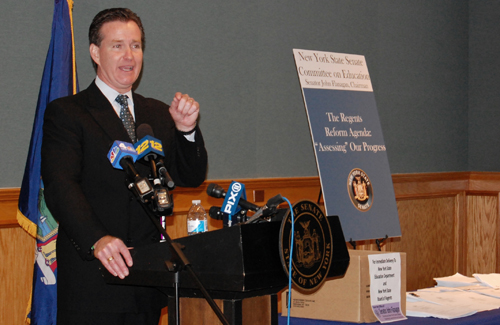Flanagan to King: Delay data storage plan, drop pre-K through 2nd grade assessments

State Senator John Flanagan is calling on the state Department of Education to delay using a controversial method of storing student data electronically for one year and proposing legislation to ban standardized testing for students in pre-K through 2nd grade.
Mr. Flanagan (R-East Northport), who chairs the senate’s Standing Committee on Education, is also sponsoring legislation to create independent oversight, as well as establishing civil and criminal penalties for unauthorized disclosure of personal information stored on the state’s student data portal received from public schools.
The actions are based on his committee’s report, “The Regents Reform Agenda: ‘Assessing’ Our Progress,” which Mr. Flanagan unveiled Thursday during a press conference in Brentwood.
[Scroll down to view the complete report]
In the report, privacy experts and school administrators raised concerns about the ability of unauthorized third-parties to access personally identifiable information, or PII, of students, teachers and principals that are collected on the state portal.
Many parents and educators have protested an agreement the state has made with inBloom, Inc. to store student data because they fear personal records could be compromised.
Strengthening public school privacy protections is one part of a series of legislative actions Mr. Flanagan is proposing.
The report includes testimony given during five public hearings Mr. Flanagan has held in recent months that sought public feedback on the state’s implementation of Common Core.
Merryl Tisch, the Board of Regents chancellor, issued a statement Friday in response to Mr. Flanagan’s report.
“While we have concerns about some aspects of the report, it’s clear that Senator Flanagan has put together some strong recommendations that we look forward to working collaboratively to address,” Ms. Tisch said in a press release.
The Common Core State Standards has been nationally recognized and adopted by most states across the country that claims to better prepare students for college and careers by requiring instructors to teach more non-fiction and rigorous math to students at a younger age.
After New York adopted Common Core, the state published lesson plans for teachers to help students achieve the new standards. The state doesn’t mandate that schools use these lesson plans, but they are available online at engageny.org.
Earlier this year, and as part of Race to the Top requirements, the state did direct New York school districts develop their own teacher evaluation systems, known as annual professional performance reviews plan (APPR), lest the districts risk losing additional available state aid.
The state Department of Education has been heavily criticized by school officials across New York for pushing the new mandates before districts were ready for them. While many educators embraced Common Core when it was first introduced, they’ve since demanded that the state hold off on implementing the new student assessments based on Common Core and the APPR plan until the rigorous curriculum is properly implemented inside the classroom.
Some of the concerns raised in Mr. Flanagan’s report include: over-testing of students, inadequate professional development funding for teacher training, incomplete and missing modules and the use of test questions that were neither age-level nor developmentally appropriate.
Mr. Flanagan’s committee also heard testimony from parents about their “children experiencing severe stress, anxiety and frustrations as they struggled to understand the new curriculum, while also trying to learn in a whole new way.” The committee also hear about teachers’ “exasperation over the lack of time and resources given to professional development training in order to adequately prepare lesson plans before teaching and testing their students,” according to a press release issued by his office Thursday.
As a result of the testimony given, the report recommends the state Department of Education immediately address several concerns, such as expediting waivers from the U.S. Department of Education “to relax onerous and rigid testing restrictions placed on certain students,” especially with English as a Second Language students and students with disabilities; producing all missing or incomplete curriculum modules; aligning assessments proportionally to curriculum actually implemented; and increasing funding for the professional development of teachers.
As for the state Legislature, Mr. Flanagan is proposing several bills for approval, including requiring state Department of Education commissioner John King to review APPR plans and eliminate unnecessary student assessments. If approved, Mr. King will also be required to report on the effectiveness of Common Core tests and programing with an independent audit.
Mr. Flanagan described the recommendations contained within the report as “a good first step in addressing the concerns heard by the committee, which overwhelmingly revolved around the issue of over-testing.”
“Setting rigorous academic standards to ensure that all students are college and career ready should always be an important goal to attain,” he said. “However, it must balanced by a fair and even implementation of those new standards to allow our children to adjust and adapt appropriately.”
The report will be submitted to the Board of Regents, Mr. King and Governor Andrew Cuomo, officials said.
The Regents Reform Agenda: ‘Assessing’ Our Progress,








